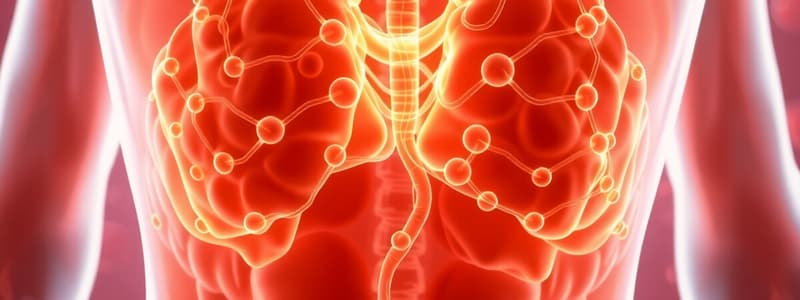Podcast
Questions and Answers
What is one of the primary symptoms of hypocortisolism, such as in Addison's disease?
What is one of the primary symptoms of hypocortisolism, such as in Addison's disease?
- Hyperglycemia
- Hypertension
- Hypoglycemia (correct)
- Increased appetite
Which condition is characterized by high cortisol levels due to adrenal gland hyperactivity?
Which condition is characterized by high cortisol levels due to adrenal gland hyperactivity?
- Primary adrenal insufficiency
- Congenital adrenal hyperplasia
- Addison's Disease
- Cushing's Disease (correct)
What is a key difference between Cushing's Syndrome and Cushing's Disease?
What is a key difference between Cushing's Syndrome and Cushing's Disease?
- Cushing's Disease is more likely to cause Addison's symptoms than Cushing's Syndrome.
- Cushing's Syndrome is always due to adrenal tumors, while Cushing's Disease is not.
- Cushing's Disease is hereditary, whereas Cushing's Syndrome is acquired.
- Cushing's Disease involves overproduction of ACTH, while Cushing's Syndrome can arise from cortisol-producing tumors. (correct)
Which of the following is NOT a potential consequence of prolonged high glucocorticoid levels?
Which of the following is NOT a potential consequence of prolonged high glucocorticoid levels?
What role does 11β-HSD2 play in the effects of cortisol in the body?
What role does 11β-HSD2 play in the effects of cortisol in the body?
What is a primary characteristic of Addison's disease?
What is a primary characteristic of Addison's disease?
Which of the following is a symptom of hypoadrenalism in Addison's disease?
Which of the following is a symptom of hypoadrenalism in Addison's disease?
Which condition is characterized by muscle wasting and fat accumulation due to excess glucocorticoids?
Which condition is characterized by muscle wasting and fat accumulation due to excess glucocorticoids?
What defines the difference between Cushing's syndrome and Cushing's disease?
What defines the difference between Cushing's syndrome and Cushing's disease?
Which of these symptoms is commonly associated with glucocorticoid deficiency in Addison's disease?
Which of these symptoms is commonly associated with glucocorticoid deficiency in Addison's disease?
Peripheral edema is associated with which condition related to glucocorticoid levels?
Peripheral edema is associated with which condition related to glucocorticoid levels?
What effect does elevated plasma potassium have in Addison's disease?
What effect does elevated plasma potassium have in Addison's disease?
Which of the following is NOT a symptom of Cushing's syndrome?
Which of the following is NOT a symptom of Cushing's syndrome?
What condition is characterized by excess cortisol in the body?
What condition is characterized by excess cortisol in the body?
Which of the following symptoms is primarily associated with Addison's Disease?
Which of the following symptoms is primarily associated with Addison's Disease?
Which hormone is primarily responsible for the regulation of cortisol release?
Which hormone is primarily responsible for the regulation of cortisol release?
What is a common physiological effect of excess cortisol in Cushing's Syndrome?
What is a common physiological effect of excess cortisol in Cushing's Syndrome?
Cushing's Disease specifically refers to what type of condition?
Cushing's Disease specifically refers to what type of condition?
Which of the following conditions could lead to adrenal hyperplasia?
Which of the following conditions could lead to adrenal hyperplasia?
What is a potential consequence of hypocortisolism?
What is a potential consequence of hypocortisolism?
What is the primary role of aldosterone in the body?
What is the primary role of aldosterone in the body?
How do steroid hormones, like cortisol, primarily affect their target cells?
How do steroid hormones, like cortisol, primarily affect their target cells?
Which of the following statements about cortisol is true?
Which of the following statements about cortisol is true?
What is primarily responsible for hyperglycemia in hypercortisolism?
What is primarily responsible for hyperglycemia in hypercortisolism?
Which of the following characterizes Cushing's disease?
Which of the following characterizes Cushing's disease?
What leads to adrenal hyperplasia in the case of hypocortisolism?
What leads to adrenal hyperplasia in the case of hypocortisolism?
Which symptom is associated with 21-hydroxylase deficiency in females?
Which symptom is associated with 21-hydroxylase deficiency in females?
What is the most likely consequence of prolonged hypertension due to hypercortisolism?
What is the most likely consequence of prolonged hypertension due to hypercortisolism?
In Cushing's syndrome, what type of tumors can cause endogenous overproduction of cortisol?
In Cushing's syndrome, what type of tumors can cause endogenous overproduction of cortisol?
What is a possible mechanism for excess ACTH to influence androgen production during stress?
What is a possible mechanism for excess ACTH to influence androgen production during stress?
What leads to a moon face appearance in patients with hypercortisolism?
What leads to a moon face appearance in patients with hypercortisolism?
Which condition is characterized by dependency on exogenous glucocorticoids?
Which condition is characterized by dependency on exogenous glucocorticoids?
What is a common effect of excess cortisol levels on potassium in the body?
What is a common effect of excess cortisol levels on potassium in the body?
What is a common symptom associated with hypocortisolism?
What is a common symptom associated with hypocortisolism?
Which of the following conditions is characterized by excessive cortisol production?
Which of the following conditions is characterized by excessive cortisol production?
Which of the following best differentiates Cushing's Disease from Cushing's Syndrome?
Which of the following best differentiates Cushing's Disease from Cushing's Syndrome?
What is a potential effect of hypercortisolism on the immune system?
What is a potential effect of hypercortisolism on the immune system?
Which enzyme is responsible for converting cortisol to its active form in specific tissues?
Which enzyme is responsible for converting cortisol to its active form in specific tissues?
Which symptom is NOT typically associated with Addison's Disease?
Which symptom is NOT typically associated with Addison's Disease?
What effect does cortisol have on blood glucose levels during stress?
What effect does cortisol have on blood glucose levels during stress?
How does cortisol affect bone formation?
How does cortisol affect bone formation?
What is a common side effect of long-term glucocorticoid use?
What is a common side effect of long-term glucocorticoid use?
What is the role of mineralocorticoid receptor (MR) in the action of cortisol?
What is the role of mineralocorticoid receptor (MR) in the action of cortisol?
Flashcards
Cushing's Syndrome
Cushing's Syndrome
A disorder caused by high levels of glucocorticoids, leading to various symptoms.
Peripheral Oedema
Peripheral Oedema
Swelling in the extremities, often caused by glucocorticoid-induced diabetes.
Insulin Resistance
Insulin Resistance
A condition where the body doesn't respond properly to insulin, especially in glucocorticoid-related diabetes.
Glucocorticoid Deficiency
Glucocorticoid Deficiency
Signup and view all the flashcards
Addison's Disease
Addison's Disease
Signup and view all the flashcards
Muscle Wasting
Muscle Wasting
Signup and view all the flashcards
Hyperpigmentation
Hyperpigmentation
Signup and view all the flashcards
Mineralocorticoid Deficiency
Mineralocorticoid Deficiency
Signup and view all the flashcards
Hypercortisolism
Hypercortisolism
Signup and view all the flashcards
Cushing's syndrome
Cushing's syndrome
Signup and view all the flashcards
Cushing's disease
Cushing's disease
Signup and view all the flashcards
ACTH
ACTH
Signup and view all the flashcards
21-hydroxylase deficiency
21-hydroxylase deficiency
Signup and view all the flashcards
Hyperglycemia
Hyperglycemia
Signup and view all the flashcards
HPA axis
HPA axis
Signup and view all the flashcards
Exogenous glucocorticoids
Exogenous glucocorticoids
Signup and view all the flashcards
Moon face
Moon face
Signup and view all the flashcards
Cardiac hypertrophy
Cardiac hypertrophy
Signup and view all the flashcards
Cortisol Class
Cortisol Class
Signup and view all the flashcards
Cortisol Synthesis Location
Cortisol Synthesis Location
Signup and view all the flashcards
Steroid Hormone Structure
Steroid Hormone Structure
Signup and view all the flashcards
Steroid Hormone Solubility
Steroid Hormone Solubility
Signup and view all the flashcards
ACTH Regulation
ACTH Regulation
Signup and view all the flashcards
Cortisol's Plasma Glucose Effect
Cortisol's Plasma Glucose Effect
Signup and view all the flashcards
Cortisol Action Sites
Cortisol Action Sites
Signup and view all the flashcards
Cushing's Syndrome
Cushing's Syndrome
Signup and view all the flashcards
Addison's Disease
Addison's Disease
Signup and view all the flashcards
Steroid Hormone Transport
Steroid Hormone Transport
Signup and view all the flashcards
Cortisol's effect on glucose
Cortisol's effect on glucose
Signup and view all the flashcards
Cortisol & Protein Catabolism
Cortisol & Protein Catabolism
Signup and view all the flashcards
Cortisol & Triglycerides
Cortisol & Triglycerides
Signup and view all the flashcards
Cortisol's Role in Inflammation
Cortisol's Role in Inflammation
Signup and view all the flashcards
Cortisol and Immunosuppression
Cortisol and Immunosuppression
Signup and view all the flashcards
11β-HSD2 Enzyme
11β-HSD2 Enzyme
Signup and view all the flashcards
Mineralocorticoid Receptor (MR)
Mineralocorticoid Receptor (MR)
Signup and view all the flashcards
Gluconeogenesis
Gluconeogenesis
Signup and view all the flashcards
Cortisol Side Effects
Cortisol Side Effects
Signup and view all the flashcards
Cortisol Nervous System
Cortisol Nervous System
Signup and view all the flashcards
Mineralocorticoid Receptor (MR)
Mineralocorticoid Receptor (MR)
Signup and view all the flashcards
11β-HSD2 Enzyme Inhibition
11β-HSD2 Enzyme Inhibition
Signup and view all the flashcards
HPA Axis
HPA Axis
Signup and view all the flashcards
Glucocorticoid Feedback Inhibition
Glucocorticoid Feedback Inhibition
Signup and view all the flashcards
Hypocortisolism
Hypocortisolism
Signup and view all the flashcards
Study Notes
Pituitary-Adrenal Axis
- The pituitary-adrenal axis is a system of hormone regulation.
- Cortisol is a glucocorticoid hormone synthesized in the adrenal cortex.
- Steroid hormones are lipid-soluble, freely permeate cell membranes, and are carried in the blood complexed to globulins.
Learning Objectives
- Identify the class of hormone to which cortisol belongs and its synthesis location.
- Describe steroid hormone signaling events.
- Understand ACTH release regulation and its effects on cortisol release.
- Explain cortisol's mechanisms of action and its target sites.
- Describe consequences of cortisol excess and deficiency, including phenotypes in Cushing's syndrome and Addison's disease.
Adrenal Gland
- The adrenal gland comprises a cortex and medulla.
- The adrenal cortex produces steroid hormones:
- Cortisol (glucocorticoid), regulating glucose levels.
- Aldosterone (mineralocorticoid), promoting salt and water retention.
- Androgens, which can be converted to testosterone.
- The adrenal medulla produces catecholamines:
- Epinephrine (adrenaline)
- Norepinephrine, a precursor of epinephrine.
Steroid Hormone Synthesis
- Steroid hormones are derived from cholesterol.
- Cholesterol synthesis occurs in the cell's mitochondria and Smooth ER.
- The rate-limiting step is the transport of free cholesterol into mitochondria, carried out by StAR.
- The converted cholesterol into pregnenolone by cytochrome P450 side-chain cleavage enzymes.
Cortisol Transport and Metabolism
- Cortisol is transported in the blood predominantly bound to corticosteroid-binding globulin (CBG), and albumin.
- The free form of cortisol exerts effects in target cells, feedbacking on the pituitary and hypothalamus.
- The liver inactivates and conjugates 95% of active and inactive steroids for excretion.
- Cortisol's circulating half-life is approximately 70 minutes.
Mechanism of Cortisol Action
- Cortisol primarily acts through the glucocorticoid receptor (GR), localized in the cytoplasm or nucleus.
- The cortisol-GR complex translocates to the nucleus, binds to glucocorticoid response elements, and regulates gene transcription.
Metabolic Effects of Cortisol
- Cortisol stimulates protein and triglyceride catabolism.
- It stimulates gluconeogenesis in the liver, inhibiting glucose uptake and thus causing a diabetogenic effect but not on brain.
- Cortisol inhibits bone formation and non-essential functions like reproduction and growth.
- Cortisol is essential for life.
Effects of Altered Glucocorticoid Levels
- Cushing's Syndrome: Excess cortisol; causes: Salt and water retention, muscle wasting, fat accumulation, osteoporosis, thin skin, poor wound healing.
- Addison's Disease: Insufficient cortisol; causes: Skin hyperpigmentation, hypoglycemia, hypotension, muscle weakness, and electrolyte imbalances.
Regulation of Glucocorticoid Secretion
- The hypothalamic-pituitary-adrenal (HPA) axis regulates cortisol secretion.
- The HPA axis is a centrally driven response to stress, regulating cortisol levels cyclically by a diurnal rhythm.
Adrenal Hyperplasia
- 21-hydroxylase deficiency: A genetic defect that alters steroid production, characterized by varying degrees of virilism in females.
Studying That Suits You
Use AI to generate personalized quizzes and flashcards to suit your learning preferences.




